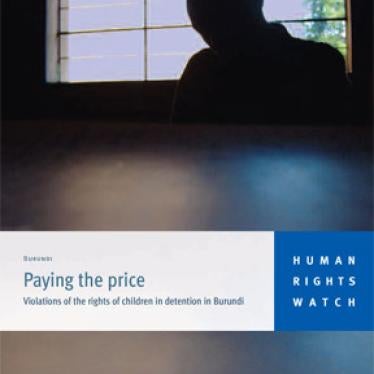(New York) - The Chinese government's refusal to allow independent trade unions is fueling worker protests, Human Rights Watch said in a new report released today.
The 50-page report, "Paying the Price: Worker Unrest in Northeast China," analyzes in detail the demonstrations that took place from March through May 2002 in three cities in northeastern China, and the government response to them.
"The Chinese Communist Party is facing a serious dilemma: it claims to protect workers, but those very same workers are protesting in the streets," said Mike Jendrzejczyk, Washington director of Human Rights Watch's Asia Division. "The workers want the right to form their own trade unions. They want to have a voice in decisions affecting their work and their benefits."
The unprecedented demonstrations lasted longer than any since the 1989 pro-democracy movement. In Liaoyang, metal workers laid off from former state-owned enterprises took to the streets intermittently over a ten-week period. In Daqing, laid-off oil workers encountered a massive show of force and security forces detained at least sixty workers for periods ranging between twenty-four hours and two weeks. In Fushun, thousands of laid-off miners and workers from nearby factories blocked roads and rail lines until they were given limited payouts.
Four key protest leaders in Liaoyang city were indicted on March 30, 2002 after leading a four-year effort to bring workers' complaints to the attention of local authorities. They may be put on trial at any time. Yao Fuxin, Pang Qingxiang, Xiao Yunliang and Wang Zhaoming are charged with "illegal assembly, marches and protests" and could face five-year prison terms. The four men have been held for almost five months with little, if any, access to family and with no legal representation.
Across China, state-owned enterprises that once promised workers lifetime employment and a secure retirement have downsized or closed. Many workers, some with decades on the job, are owed months in back pay and have lost their pensions, as well as health and social welfare benefits.
"These workers are protesting the hypocrisy of the Chinese government," said Jendrzejczyk. "Although the Chinese constitution calls workers 'the masters of the country,' the government treats protesting workers as criminals."
Chinese law prohibits workers from organizing independently. Only one organization, the All China Federation of Trade Unions (ACFTU), can legally represent workers, and it is under the control of state authorities. It has never spoken out against the laws and regulations routinely used to justify putting independent labor activists in prison.
Human Rights Watch found that the Chinese government's response to all three protests was relatively restrained, in part perhaps because labor unrest threatens the legitimacy of the Chinese Communist Party, and authorities fear an even broader backlash if they crack down too hard. In their handling of the protests, however, Chinese officials violated fundamental rights to free association, expression and assembly. Authorities refused to issue permits for demonstrations, threatened employed workers with loss of pay if family members took part in rallies, and placed restrictions on media access to the affected areas. Security forces physically assaulted protesters, seizing many for short periods of time and refusing to release them until they promised to forego further protests.
Human Rights Watch called on the Chinese government to immediately and unconditionally release all those detained for peaceful activities to promote the rights of workers to associate freely. This urgent request applies to workers held in connection with this year's protests in the northeast, to those held for trade union activism during the 1989 pro-democracy movement and in 1992 and 1997-98, and to those in prison for exposing workers' problems to a broad audience within China and to the international media.
China should also fulfill its obligations under the International Covenant on Economic, Social and Cultural Rights that it ratified in 2001. China has declared that the application of Article 8(1)(a) must be consistent with China's Trade Union Law--the very law that denies China's workers the right to organize independent trade unions.
As a member of the International Labor Organization (ILO), China is obligated to abide by its core principles, including free association and the right to collective bargaining. Human Rights Watch called on China's trading partners and governments involved in bilateral human rights "dialogues" to put pressure on Beijing to ask ILO's assistance in reforming its labor practices to bring them into conformity with international freedom of association standards.
Human Rights Watch further appealed to corporations doing business in China, urging that they refrain from complying with requests from Chinese authorities to discriminate against, fire, or in any way discipline workers who attempt to form their own unions, peacefully protest their conditions of work, or go on strike.







